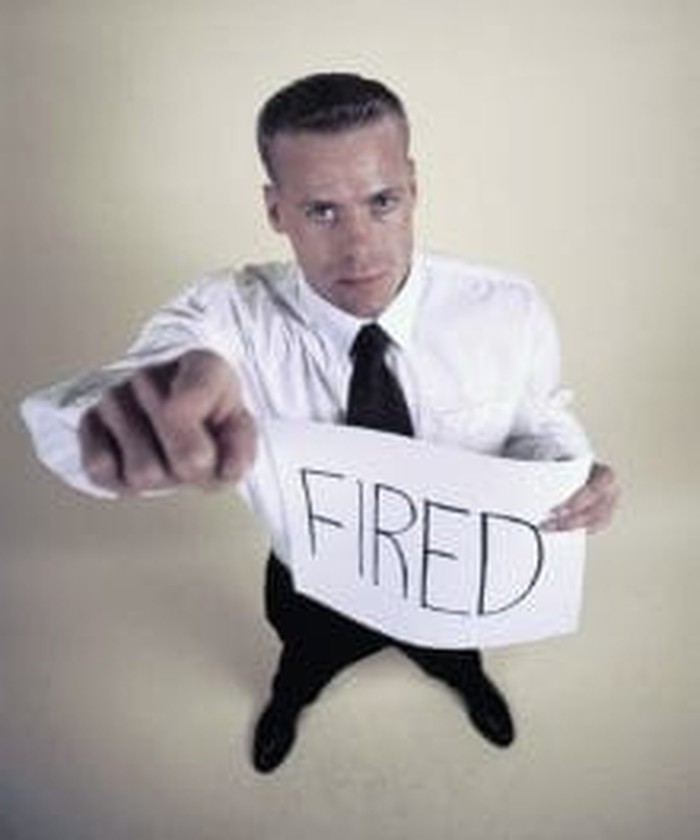When to Fire Your Pastor
- Dr. Roger Barrier Preach It, Teach It
- Updated Nov 13, 2013

Editor's Note: Pastor Roger Barrier's "Ask Roger" column regularly appears at Preach It, Teach It. Every week at Crosswalk, Dr. Barrier puts nearly 40 years of experience in the pastorate to work answering questions of doctrine or practice for laypeople, or giving advice on church leadership issues. Email him your questions at roger@preachitteachit.org.
I’ve seen it done wrong. I’ve seen it done right. Firing a pastor is a traumatic thing.
I’VE SEEN IT DONE WRONG.
From seven to seventeen I grew under the ministry of Brother Baker. He was a fine man with strong morals and values. He grew the church from about 75 people to over 500 in worship on Sundays. Five Hundred was a big church in the 1950s and 60s.
When I was in high school two very powerful and influential men decided it was time for the pastor to leave. Mr. Powerful and Mr. Influential decided that was time for Brother Baker to go. They schemed and manipulated to blame failure on the pastor. The church family was “hood winked” into believing Brother Baker needed to be replaced.
I had an inside view. You see, I was best friends with Mr. Influential’s and Mr. Powerful’s two sons. I played golf with Brother Baker and my dad every Saturday afternoon.
I watched the pain and lived through the struggles as my pastor attempted to understand what he’d done wrong. I remember him on the golf course shaking his head in bewilderment wondering about just what he had done to deserve the personal tragedy that was inflicted upon him. He had three fine sons. They are now successful business men. I remember the day they drove out of town so angry and bitter. They hated the church for what it had done to their dad. At least two of them have not darkened the door of a church since.
These two divisive men had no business doing what they did. Brother Baker had done nothing to justify their behavior.
WHEN IS IT TIME TO FIRE YOUR PASTOR?
Let me say as we begin: the reasons I give here are the ones I observe in the Christian church today. They are by no means the only ones.
Let Me Give You Several Guidelines.
1. MORAL FAILURE (Exodus 20:14; 1 Timothy 3:1-13)
This is an easy one. There are consequences to this sin for a pastor like no other. They are no longer qualified to serve as pastors.
I’ve fired people on the administration level and felt no need to tell the whole church.
On the other hand, the congregation must be told about church leaders who fail (1 Timothy 5:20). On too many occasions I’ve had say words like these to the congregation: “I want you to know that X can no longer work in our church. He has done something that violates our trust and compromises his ability to continue in his/her job. I want you to treat him/her and their family with love and grace as we work through this difficult time for both him and the church. I will not tell you what he/she did. But, I want you to remember that there is not one thing he did that many of you haven’t done, too.”
This kind of a speech stops the rumors, let’s the congregation know that leaders don’t get away with sin, and assures the congregation that the matter is not being swept under the rug.
2. FISCAL MALFEASANCE (Jeremiah 2:26; 5:3; 1 Timothy 3:3; and 1 Peter 4:15)
In other words, they are stealing money, misusing funds. They are loving it and what it can do for them too much. Pastors are fired immediately for stealing money. Misusing funds needs a little more scrutiny (Acts 5:1-11).
My father served as church treasure for many years. Each Sunday, after the tithes and offerings were counted, the money and checks were locked in a floor safe in an office closet. Even still, they knew someone was stealing money from the locked safe. He and several leaders set up sting operation to catch the thief. One Sunday afternoon about three o’clock the worship leader entered the office and went straight to the closet safe and began to spin the combination. The safe opened; he had cash in his hands. My dad fired him on the spot.
In some small churches the pastor puts the offerings in his own personal checking account or in a checking account which only he/her can access. The pastor must agree to a check and balance process to protect the church’s money from perceived or actual misuse. If the pastor refuses, fire him/her (1 Timothy 3:7).
3. FAILURE TO SHEPHERD THE SHEEP (John 21:15-17).
A sacred trust exists between the pastor and his/her sheep.
As we read the Gospels we are immediately struck that Jesus’ favorite name for Himself was not teacher or father, or Lord. He liked to think of Himself as a Shepherd. The good Shepherd knows his sheep by name. He leaves ninety-nine in order to search for one lost sheep. He is the door of the sheep pen; He lays down his life for his sheep. These things are the job description for a pastor.
In fact, the Christian faith begins with Jesus commissioning Peter as a Shepherd, no longer a fisher man: “I am a Shepherd, you be a shepherd, too.”
Shepherds don’t parade sheep down Main Street. The Shepherd’s best work is done on the back side of the mountain when no one is looking. But, don’t kid yourself, news of the work when no one is looking gets around fast.
Andrew Blackwood used to say, “A house going pastor makes a church going people.”
Shepherding involves caring for, protecting, nurturing, healing and feeding the sheep. Pastors in larger churches will organize meeting the needs of the sheep—both those inside and outside of the sheep fold.
One of my young pastor friends invested much more time meeting his own needs than the needs of his sheep. He didn’t last long before he was fired. And, tragically, he never understood why they let him go.
If pastors neglect pastoring, they ought to be fired.
4. LYING, DECEIVING OR MISLEADING THE CONGREGATION (Romans 9:1; and 2 Corinthians 11:31)
The issue here is trust and truth. One of my close associates used to say, “Telling the truth always turns out better than making up all sorts of lies to cover your tracks.”
One of our pastors failed to accomplish an assignment. That was not the problem. That happens to all of us. The problem was that he lied about it.
I knew he was lying and gave him multiple opportunities to admit the truth. I found the evidence of his deceit in his car. The church leaders and I let him go.
5. PREACHING FALSE DOCTRINE AND/OR NEGLECTING TO CONSISTENTLY SHARE THE GOSPEL (Jeremiah 6:14; Ezekiel 13:10; and 1 Timothy 4:1-11).
As a pastor, these passages frighten me. God was accusing the religious leaders of telling the people that all was well when it was not well (saying “peace, peace” when there is no peace). I was afraid that I might minimize the claims and cost of following Christ. I was afraid that I would succumb to watering down the gospel by making it easy to receive while neglecting to teach people that “when Jesus Christ calls a man He bids him come and die” (Dietrich Bonheoffer). Following Christ means full surrender at any price. It is so easy to preach the first part and neglect the second.
I believe that in an effort to reach people at any cost in today’s Christian culture that we have forgotten (if we ever knew) that the gospel is not properly communicated until people have enough information to reject it. That is how Jesus did it. Remember the Rich Young Ruler (Matthew 19:20-22).
I HAVE SEEN IT DONE RIGHT.
When I was six our church had a big “Good Bye” party for the pastor and his family. I remember the light-hearted atmosphere and the food and the singing and talent show and funny skits of entertainment.
It was common knowledge that the church had decided to ask him to leave. He was fired and I was confused. How could they have a party, pretending everything was fine, when they were terminating the man?
When I grew older I found out the rest of the story. He was a Southern Baptist in name and a Methodist at heart. His preaching and doctrine reflected his true allegiance.
A group of church leaders sat down to discuss their concerns with the pastor. He was surprised at their observations. The leaders were in no hurry. Over time he concluded that he was more Methodist than Baptist. No one got angry or demanded his resignation. They talked it over for several months and worked out a plan of transition. The church was involved early in the process and the leaders told him that they would keep him as pastor until he could integrate himself into the Methodist system.
In less than three months he was pastoring a Methodist church and they had the party. No one got hurt. The matter was handled in a Christian way and peace reigned in the congregation.
Here is what I learned that was so right.
Spiritual men and women handled the issue (Galatians 6:1-2).
The issues were dealt with up front and in a loving way. No one was manipulating anyone.
The pastor knew exactly what the problem was. Not like poor Brother Baker who was never told exactly what he’d done wrong.
The church doctrine was upheld. This is not to say that Methodist doctrine is wrong—it was just different from Baptist doctrine.
The pastor was given plenty of time to conform his preaching and teaching to basic Baptist beliefs, but they all finally agreed that changing his basic beliefs was not possible for him.
Christian fellowship was upheld. Everyone enjoyed the party.
FIRING THE PASTOR IS SELDOM SMOOTH BECAUSE A PASTOR WHO NEEDS TO BE FIRED AND CAN’T SEE IT USUALLY STRUGGLES WITH DIBILITATING DISFUNCTIONS.
I’ve fired sixteen paid staff (that I remember) in forty years of ministry. As far as I am concerned, that is about sixteen too many. But it had to be done.
Here is what I’ve learned about firing a pastor:
1. Give them time to improve their performance to well defined, acceptable levels. If they won’t or can’t succeed, it is time to let them go.
2. No one ever feels that they deserve to be fired.
3. There is no correct to way to let someone go.
4. However you do it they are never going to like you again.
5. Have them turn in their keys, clean out and vacate their office immediately. Not everyone needs to be dealt with like this.
6. People in the church who know and love the one being fired will often express displeasure in public ways.
7. Give a nice transitional severance package to help them pick up the pieces and start over. Let them know that if they start causing disunity or trouble in the church that the package will end immediately.
8. Remember that hurting people need comfort and care.
I have no illusions that anyone will agree entirely with my article. The subject is too complex and subjective.
Different situations require different solutions. Moral failure and fiscal malfeasance are rather clear cut. Everything else needs understanding, wisdom and care before proceeding and attempting to bring resolution.
I hope you never have to fire anyone—especially your pastor; but, if you do, may God give you a gentle and humble heart, like Jesus, when you start out on this slippery path.
I hope you find this topic helpful.
Sincerely, Roger
P.S. By the way, some studies show that 20% of the churches do 80% of the firings. As a pastor, there are some churches you really don’t want to go to.

Publication date:



















